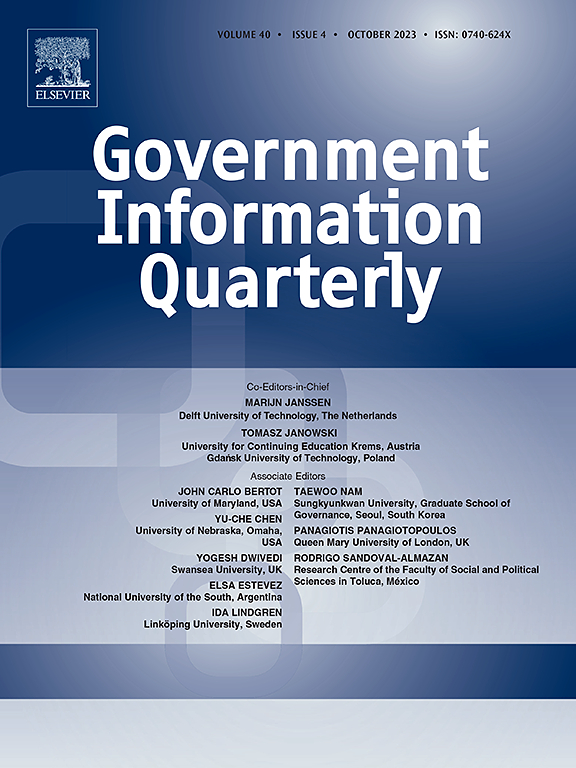Theorizing the evolution of public data ecosystems: An empirically grounded multi-generational model and future research agenda
IF 10
1区 管理学
Q1 INFORMATION SCIENCE & LIBRARY SCIENCE
引用次数: 0
Abstract
Public Data Ecosystems (PDEs) are increasingly viewed as dynamic socio-technical systems shaped by evolving interactions among actors, infrastructures, data types, and governance mechanisms. Yet, most existing research remains static or domain-specific, offering limited insight into the temporal and co-evolutionary dynamics of PDEs. To address this gap, this study adopts a theory-building approach to examine how PDEs evolve over time and to define a forward-looking research agenda. Drawing on empirical insights from five European countries, we investigate how key meta-characteristics and attributes of PDEs manifest, shift, and co-evolve in practice. Leveraging a recent multi-generational model as an analytical lens, we assess its alignment with real-world trajectories, identify overlooked and emerging features, and revise its structure accordingly. In doing so, we theorize PDE evolution as a multi-generational process shaped by institutional, technological, and contextual dynamics. This results in a refined model that better captures the complexity and diversity of PDE development, particularly considering emerging technologies such as artificial intelligence (AI), generative AI, and large language models (LLMs) shaping the forward-looking PDE generation. Building on these insights, we propose a future research agenda comprising 17 directions organized around revised meta-characteristics. This agenda supports the development of sustainable, resilient, and intelligent PDEs. The study contributes to the theorization of PDEs by offering an empirically grounded, temporally aware, and actionable roadmap for future research and policy design.
公共数据生态系统演化的理论化:基于经验的多代模型和未来研究议程
公共数据生态系统(PDEs)越来越被视为动态的社会技术系统,由行动者、基础设施、数据类型和治理机制之间不断发展的相互作用形成。然而,大多数现有的研究仍然是静态的或特定于领域的,对pde的时间和共同进化动态提供了有限的见解。为了解决这一差距,本研究采用理论构建方法来研究pde如何随着时间的推移而演变,并确定前瞻性的研究议程。借鉴五个欧洲国家的经验见解,我们研究了pde的关键元特征和属性在实践中如何显现、转变和共同演化。利用最近的多代模型作为分析镜头,我们评估其与现实世界轨迹的一致性,识别被忽视和新出现的特征,并相应地修改其结构。在此过程中,我们将PDE进化理论化为一个由制度、技术和环境动态形成的多代过程。这导致了一个精细的模型,更好地捕捉了PDE开发的复杂性和多样性,特别是考虑到新兴技术,如人工智能(AI)、生成式AI和大型语言模型(llm)塑造了前瞻性的PDE生成。基于这些见解,我们提出了一个未来的研究议程,包括围绕修订后的元特征组织的17个方向。该议程支持可持续、有弹性和智能的pde发展。该研究为未来的研究和政策设计提供了一个基于经验、具有时效性和可操作性的路线图,从而有助于将pde理论化。
本文章由计算机程序翻译,如有差异,请以英文原文为准。
求助全文
约1分钟内获得全文
求助全文
来源期刊

Government Information Quarterly
INFORMATION SCIENCE & LIBRARY SCIENCE-
CiteScore
15.70
自引率
16.70%
发文量
106
期刊介绍:
Government Information Quarterly (GIQ) delves into the convergence of policy, information technology, government, and the public. It explores the impact of policies on government information flows, the role of technology in innovative government services, and the dynamic between citizens and governing bodies in the digital age. GIQ serves as a premier journal, disseminating high-quality research and insights that bridge the realms of policy, information technology, government, and public engagement.
 求助内容:
求助内容: 应助结果提醒方式:
应助结果提醒方式:


